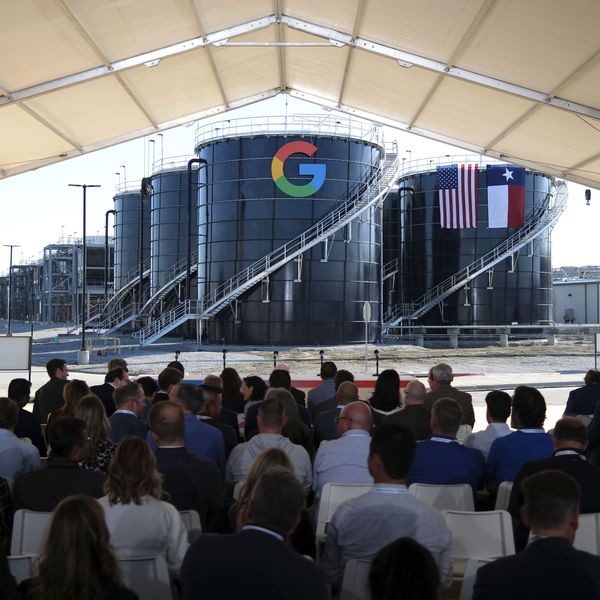
Electric induction stovetops are more energy-efficient, healthier, and safer than gas ranges. (Photo: Dennis Schroeder via National Renewable Energy Lab).
Electrifying US Buildings by 2050 Would Be Like Taking 65 Million Cars Off Road: Report
"A new technological revolution is underway to replace fossil fuel heating and cooking with electric technologies."
Replacing fossil fuel-based heating and cooking systems with electric technologies in the majority of U.S. residential and commercial buildings over the next three decades would lead to a substantial reduction in greenhouse gas emissions--equivalent to removing 65 million cars from the road, according to a new study out Tuesday.
"Change is upon us--we just need to embrace it."
--Susan Rakov, Environment America
Assembled by Environment America Research & Policy Center, U.S. PIRG Education Fund, and Frontier Group, the report--entitled Electric Buildings: Repowering Homes and Businesses for Our Health and Environment--documents how cutting fossil fuel usage out of homes and offices through electrification would decrease the carbon emissions driving the climate emergency, lower utility bills, and improve public health.
As the report notes:
Wind and solar power are rapidly replacing dirty fossil fuels like coal as leading sources of our electricity. As our electricity grid becomes cleaner, replacing the direct burning of gas, heating oil, and propane in our buildings with electricity will reduce pollution of our air, land, and water from fossil fuel production and use.
New and improved technologies are putting clean, efficient electric space heating and water heating, and electric appliances like stoves, within the reach of most American households. Analysis shows that electrifying the vast majority of America's residences and commercial spaces by 2050 could reduce net greenhouse gas emissions from the residential and commercial sectors by about 306 million metric tons of carbon dioxide in 2050... It would also reduce pipeline gas usage by 7,012.9 trillion cubic feet.
"We have the tools and technology right now to make every home and most businesses in America run--and run better--on clean renewable energy," Susan Rakov, chair of Environment America Research & Policy Center's Clean Energy program, said in a statement.
"When my gas stove failed this year, I bought an induction stove," Rakov continued. "It sure is different--and I love it. It boils water faster than my old gas stove, it doesn't release dangerous air pollutants into my home when we're cooking, and I no longer have to worry about escaping methane from the stove contributing to global warming."
Induction stoves are just one of the high efficiency electric appliances highlighted in the report. Additional electric technologies that can help the U.S. end its reliance on dirty, polluting energy sources include air-source and geothermal heat pumps and water heaters.
In addition to its environmental and public health advantages, building electrification can also benefit household pocketbooks.
"Advances in these technologies make choosing a fully electric system for homes and commercial buildings an efficient and affordable decision for owners in almost all new construction situations," Environment America pointed out. "In some cities, installing a heat pump over fossil fuel heating methods in a new home could save between $1,600 and $6,800 for space and water heating over a 15-year period. In other locations, savings could reach as high as $13,700 during the same timespan."
There are nearly 140 million housing units and 5.6 million commercial buildings in the U.S. According to Environment America, "fossil fuel combustion in U.S. homes and businesses accounted for almost 9%" of the nation's total carbon emissions in 2018.
That's why the authors of the report stress that repowering the built environment is a crucial part of slashing emissions, improving efficiency, and putting the country on a path toward 100% renewable energy. To accelerate the transition from fossil fuels to clean electricity in U.S. buildings, they make the following recommendations to policymakers at the local, state, and federal levels:
- Require all-electric systems in new construction;
- Implement rebate programs, incentives, and low-cost financing;
- Implement regulatory solutions, including rate design and fuel-switching regulation changes;
- Create and expand tax incentives for electrified buildings;
- Require building energy transparency and implement building performance standards that limit carbon emissions;
- Educate developers, contractors, retailers, and consumers about options for, and benefits of, electrification; and
- Update appliance efficiency standards.
While building electrification might sound unprecedented, Johanna Neumann, senior director of Environment America Research & Policy Center's Campaign for 100% Renewable Energy, put the process into a longer and more familiar context.
"Last century, many families saw their quality of life improve when they switched from a coal-burning stove to an electric or gas range, or an icebox to an electric refrigerator," Neumann said. "Today, a new technological revolution is underway to replace fossil fuel heating and cooking with electric technologies."
"The sooner America makes the switch," she added, "the sooner we'll realize the benefits of cleaner and more efficient energy."
According to Rakov, "Change is upon us--we just need to embrace it."
An Urgent Message From Our Co-Founder
Dear Common Dreams reader, The U.S. is on a fast track to authoritarianism like nothing I've ever seen. Meanwhile, corporate news outlets are utterly capitulating to Trump, twisting their coverage to avoid drawing his ire while lining up to stuff cash in his pockets. That's why I believe that Common Dreams is doing the best and most consequential reporting that we've ever done. Our small but mighty team is a progressive reporting powerhouse, covering the news every day that the corporate media never will. Our mission has always been simple: To inform. To inspire. And to ignite change for the common good. Now here's the key piece that I want all our readers to understand: None of this would be possible without your financial support. That's not just some fundraising cliche. It's the absolute and literal truth. We don't accept corporate advertising and never will. We don't have a paywall because we don't think people should be blocked from critical news based on their ability to pay. Everything we do is funded by the donations of readers like you. Will you donate now to help power the nonprofit, independent reporting of Common Dreams? Thank you for being a vital member of our community. Together, we can keep independent journalism alive when it’s needed most. - Craig Brown, Co-founder |
Replacing fossil fuel-based heating and cooking systems with electric technologies in the majority of U.S. residential and commercial buildings over the next three decades would lead to a substantial reduction in greenhouse gas emissions--equivalent to removing 65 million cars from the road, according to a new study out Tuesday.
"Change is upon us--we just need to embrace it."
--Susan Rakov, Environment America
Assembled by Environment America Research & Policy Center, U.S. PIRG Education Fund, and Frontier Group, the report--entitled Electric Buildings: Repowering Homes and Businesses for Our Health and Environment--documents how cutting fossil fuel usage out of homes and offices through electrification would decrease the carbon emissions driving the climate emergency, lower utility bills, and improve public health.
As the report notes:
Wind and solar power are rapidly replacing dirty fossil fuels like coal as leading sources of our electricity. As our electricity grid becomes cleaner, replacing the direct burning of gas, heating oil, and propane in our buildings with electricity will reduce pollution of our air, land, and water from fossil fuel production and use.
New and improved technologies are putting clean, efficient electric space heating and water heating, and electric appliances like stoves, within the reach of most American households. Analysis shows that electrifying the vast majority of America's residences and commercial spaces by 2050 could reduce net greenhouse gas emissions from the residential and commercial sectors by about 306 million metric tons of carbon dioxide in 2050... It would also reduce pipeline gas usage by 7,012.9 trillion cubic feet.
"We have the tools and technology right now to make every home and most businesses in America run--and run better--on clean renewable energy," Susan Rakov, chair of Environment America Research & Policy Center's Clean Energy program, said in a statement.
"When my gas stove failed this year, I bought an induction stove," Rakov continued. "It sure is different--and I love it. It boils water faster than my old gas stove, it doesn't release dangerous air pollutants into my home when we're cooking, and I no longer have to worry about escaping methane from the stove contributing to global warming."
Induction stoves are just one of the high efficiency electric appliances highlighted in the report. Additional electric technologies that can help the U.S. end its reliance on dirty, polluting energy sources include air-source and geothermal heat pumps and water heaters.
In addition to its environmental and public health advantages, building electrification can also benefit household pocketbooks.
"Advances in these technologies make choosing a fully electric system for homes and commercial buildings an efficient and affordable decision for owners in almost all new construction situations," Environment America pointed out. "In some cities, installing a heat pump over fossil fuel heating methods in a new home could save between $1,600 and $6,800 for space and water heating over a 15-year period. In other locations, savings could reach as high as $13,700 during the same timespan."
There are nearly 140 million housing units and 5.6 million commercial buildings in the U.S. According to Environment America, "fossil fuel combustion in U.S. homes and businesses accounted for almost 9%" of the nation's total carbon emissions in 2018.
That's why the authors of the report stress that repowering the built environment is a crucial part of slashing emissions, improving efficiency, and putting the country on a path toward 100% renewable energy. To accelerate the transition from fossil fuels to clean electricity in U.S. buildings, they make the following recommendations to policymakers at the local, state, and federal levels:
- Require all-electric systems in new construction;
- Implement rebate programs, incentives, and low-cost financing;
- Implement regulatory solutions, including rate design and fuel-switching regulation changes;
- Create and expand tax incentives for electrified buildings;
- Require building energy transparency and implement building performance standards that limit carbon emissions;
- Educate developers, contractors, retailers, and consumers about options for, and benefits of, electrification; and
- Update appliance efficiency standards.
While building electrification might sound unprecedented, Johanna Neumann, senior director of Environment America Research & Policy Center's Campaign for 100% Renewable Energy, put the process into a longer and more familiar context.
"Last century, many families saw their quality of life improve when they switched from a coal-burning stove to an electric or gas range, or an icebox to an electric refrigerator," Neumann said. "Today, a new technological revolution is underway to replace fossil fuel heating and cooking with electric technologies."
"The sooner America makes the switch," she added, "the sooner we'll realize the benefits of cleaner and more efficient energy."
According to Rakov, "Change is upon us--we just need to embrace it."
Replacing fossil fuel-based heating and cooking systems with electric technologies in the majority of U.S. residential and commercial buildings over the next three decades would lead to a substantial reduction in greenhouse gas emissions--equivalent to removing 65 million cars from the road, according to a new study out Tuesday.
"Change is upon us--we just need to embrace it."
--Susan Rakov, Environment America
Assembled by Environment America Research & Policy Center, U.S. PIRG Education Fund, and Frontier Group, the report--entitled Electric Buildings: Repowering Homes and Businesses for Our Health and Environment--documents how cutting fossil fuel usage out of homes and offices through electrification would decrease the carbon emissions driving the climate emergency, lower utility bills, and improve public health.
As the report notes:
Wind and solar power are rapidly replacing dirty fossil fuels like coal as leading sources of our electricity. As our electricity grid becomes cleaner, replacing the direct burning of gas, heating oil, and propane in our buildings with electricity will reduce pollution of our air, land, and water from fossil fuel production and use.
New and improved technologies are putting clean, efficient electric space heating and water heating, and electric appliances like stoves, within the reach of most American households. Analysis shows that electrifying the vast majority of America's residences and commercial spaces by 2050 could reduce net greenhouse gas emissions from the residential and commercial sectors by about 306 million metric tons of carbon dioxide in 2050... It would also reduce pipeline gas usage by 7,012.9 trillion cubic feet.
"We have the tools and technology right now to make every home and most businesses in America run--and run better--on clean renewable energy," Susan Rakov, chair of Environment America Research & Policy Center's Clean Energy program, said in a statement.
"When my gas stove failed this year, I bought an induction stove," Rakov continued. "It sure is different--and I love it. It boils water faster than my old gas stove, it doesn't release dangerous air pollutants into my home when we're cooking, and I no longer have to worry about escaping methane from the stove contributing to global warming."
Induction stoves are just one of the high efficiency electric appliances highlighted in the report. Additional electric technologies that can help the U.S. end its reliance on dirty, polluting energy sources include air-source and geothermal heat pumps and water heaters.
In addition to its environmental and public health advantages, building electrification can also benefit household pocketbooks.
"Advances in these technologies make choosing a fully electric system for homes and commercial buildings an efficient and affordable decision for owners in almost all new construction situations," Environment America pointed out. "In some cities, installing a heat pump over fossil fuel heating methods in a new home could save between $1,600 and $6,800 for space and water heating over a 15-year period. In other locations, savings could reach as high as $13,700 during the same timespan."
There are nearly 140 million housing units and 5.6 million commercial buildings in the U.S. According to Environment America, "fossil fuel combustion in U.S. homes and businesses accounted for almost 9%" of the nation's total carbon emissions in 2018.
That's why the authors of the report stress that repowering the built environment is a crucial part of slashing emissions, improving efficiency, and putting the country on a path toward 100% renewable energy. To accelerate the transition from fossil fuels to clean electricity in U.S. buildings, they make the following recommendations to policymakers at the local, state, and federal levels:
- Require all-electric systems in new construction;
- Implement rebate programs, incentives, and low-cost financing;
- Implement regulatory solutions, including rate design and fuel-switching regulation changes;
- Create and expand tax incentives for electrified buildings;
- Require building energy transparency and implement building performance standards that limit carbon emissions;
- Educate developers, contractors, retailers, and consumers about options for, and benefits of, electrification; and
- Update appliance efficiency standards.
While building electrification might sound unprecedented, Johanna Neumann, senior director of Environment America Research & Policy Center's Campaign for 100% Renewable Energy, put the process into a longer and more familiar context.
"Last century, many families saw their quality of life improve when they switched from a coal-burning stove to an electric or gas range, or an icebox to an electric refrigerator," Neumann said. "Today, a new technological revolution is underway to replace fossil fuel heating and cooking with electric technologies."
"The sooner America makes the switch," she added, "the sooner we'll realize the benefits of cleaner and more efficient energy."
According to Rakov, "Change is upon us--we just need to embrace it."

